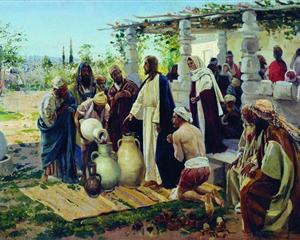This post is by Brody Stewart, Verbum Marketing and Promotions Coordinator
The Sorrowful Mysteries have always seemed the easiest for me to meditate upon. There’s something altogether relatable about Jesus in his moments of weakness, anxiety, and suffering. While we see Jesus being tempted by Satan (Lk. 4:2), or weeping at the death of his friend (Jn. 11:35), we get a real sense of his humanity in the first of the Sorrowful Mysteries: The Agony in the Garden.
Then Jesus came with them to a place called Gethsemane, and he said to his disciples, “Sit here while I go over there and pray.” He took along Peter and the two sons of Zebedee, and began to feel sorrow and distress. Then he said to them, “My soul is sorrowful even to death. Remain here and keep watch with me.” He advanced a little and fell prostrate in prayer, saying, “My Father, if it is possible, let this cup pass from me; yet, not as I will, but as you will.” When he returned to his disciples he found them asleep. He said to Peter, “So you could not keep watch with me for one hour? Watch and pray that you may not undergo the test. The spirit is willing, but the flesh is weak.” Withdrawing a second time, he prayed again, “My Father, if it is not possible that this cup pass without my drinking it, your will be done!” Then he returned once more and found them asleep, for they could not keep their eyes open. He left them and withdrew again and prayed a third time, saying the same thing again. Then he returned to his disciples and said to them, “Are you still sleeping and taking your rest? Behold, the hour is at hand when the Son of Man is to be handed over to sinners. Get up, let us go. Look, my betrayer is at hand.” (Matt 26:36-46, NABRE)
The first thing that strikes me about this account of Christ’s agony is that he is “sorrowful even to death.” The first time I read this passage, I was taken aback. “Even to death?” I wondered, “Isn’t that a bit… melodramatic?” But we see in Saint Luke’s account of events that Jesus isn’t just using dramatic language:
He was in such agony and he prayed so fervently that his sweat became like drops of blood falling on the ground. (Lk 22:44, NABRE)
We’ve all experienced some amount of sadness, anxiety, or depression. Some of us have experienced more than our share. But have you ever been so agonized that you sweat blood?
There’s a reason Jesus is so perturbed: he’s God. He knows precisely what awaits him in a few short hours. He knows precisely how he will suffer at the hands of Roman soldiers. And he knows precisely when and how he will die.

As the God of the universe, Jesus could choose to prevent all of this. But what does he do instead? He prays to his Father that “this cup [might] pass from me.” He asks for a way out. This is exactly what you or I would do in our own sorrowful circumstances. Jesus has lowered himself to the level of broken humanity.
But Jesus continues his prayer: “yet, not as I will, but as you will.” He recognizes his own dependence upon the Father. He sees the necessity of his mission. He resolves to carry it out.
Jesus participates in our suffering, and models the proper response.
After his first hour of prayer, he returns to find his disciples asleep. He’s understandably upset. He’s lived and travelled with these men for the last three years. These are his most loyal servants. These are his closest friends. And they can’t stay awake for one hour.
Jesus withdraws to pray again, and again, finds disciples asleep. This happens not once, not twice, but three times. The men Jesus trusted most—Peter, James, and John—have failed him three times. And, on this most agonizing night, their failure is followed by Judas’ ultimate betrayal.
Imagine the tone in Jesus’ voice when he asks, “Are you still sleeping? Look, my betrayer is at hand.”
With the weight of the world on his shoulders, he is failed and betrayed by his closest friends.
Jesus’ bodily suffering may not have begun yet, but in the Garden of Gethsemane he experienced the fullness of spiritual, mental, and emotional agony.
When I meditate upon this portrait of Jesus, I see a God who intimately understands our sufferings. I see a God who cares to share in our sorrows. I see a God who is truly man.




